Fed Cup: Great Britain seek to beat Japan to reach World Group
- Published
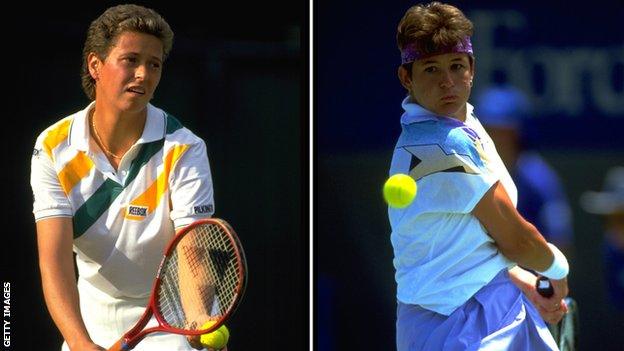
Jo Durie and Clare Wood were part of the GB team who last competed in the top tier of the Fed Cup - 25 years ago
Japan v Great Britain - Fed Cup World Group II play-off |
|---|
Venue: Bourbon Beans Dome, Miki, Japan Dates: 21-22 April |
Coverage: Live TV streaming on the BBC Sport website and mobile app, Radio 5 live updates, plus live text commentary on 22 April |
The last time Great Britain were in the elite group of the Fed Cup one of the current team was not even born, two were toddlers and one was aged four.
"It seems ridiculous now - it wasn't that long ago, surely?" said Julie Salmon, a member of the GB team from 1993 - the last time the country was in the World Group of the women's tennis team competition.
The 25-year wait for a return will be over this weekend if Great Britain beat hosts Japan in their World Group II play-off. Victory will also mean the possibility of playing at home for the first time in a quarter of a century.
British number one Johanna Konta, 26, and Heather Watson, 25, will be the singles players for the tie on indoor hard courts in Miki, while Anna Smith, 29 and debutant Gabi Taylor, 20, also feature.
The first of Saturday's two singles rubbers starts at 05:00 BST, while Sunday's action - the reverse singles plus a doubles match - begins at 04:00 BST.
BBC Sport has spoken to three members of the 1993 team - Jo Durie, Clare Wood and Salmon - to assess the current team's chances and find out why it is worth setting your alarm clock early to follow the tie on the BBC.
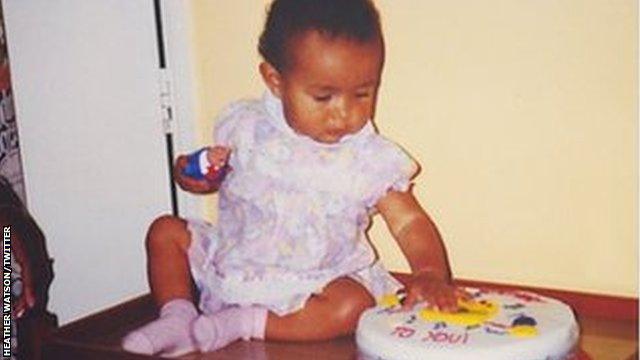
Heather Watson was aged one the last time Great Britain were in the World Group of the Fed Cup
Home sweet home
Salmon still has the memorabilia she picked up off the floor when the scoreboards were being dismantled after the 1977 Federation Cup - as it was then known - at Eastbourne, where she went to watch as a 12-year-old.
"That inspired me to play," said the 52-year-old, who competed in the event between 1988 and 1993.
"I stayed until the very last minute, when they were taking down the scoreboards - and I've still got them somewhere. I took as many pictures and country names as I possibly could, to my parents' annoyance - they probably wanted to get home.
"To have a tie in this country and what that could do to inspire juniors to play and compete... we've got such a fantastic team that it would be amazing to eventually get a home tie."

British fans played their part in creating an incredible atmosphere during home matches when Great Britain won the Davis Cup in 2015
Teams in the World Group play home and away ties, while those in the Europe/Africa Zone - where Great Britain have been stuck for so long - play a week-long round-robin competition at one venue to determine who will make the play-offs.
While Britain have made the play-offs for the fourth time in seven years, each time they have been drawn to play away from home.
A flawed format?
In Durie, Salmon and Wood's day, the Federation Cup followed a different format - more like a tennis World Cup with 32 countries participating in a week-long event in one country.
But that changed in 1995 when a multi-tiered league system was introduced, and Great Britain have been unable to climb back to the elite level.
"That Euro-Africa Group I zone is the toughest zone in the world to get out of and stay out of," Wood said.
"You've got nations like Croatia, Serbia, sometimes Romania - it's hard, high-quality tennis so you've got to have strength in depth."
Britain lost play-offs in Sweden in 2012, in Argentina in 2013 and in Romania last year, and defeat in Japan this weekend will send them back to square one again.
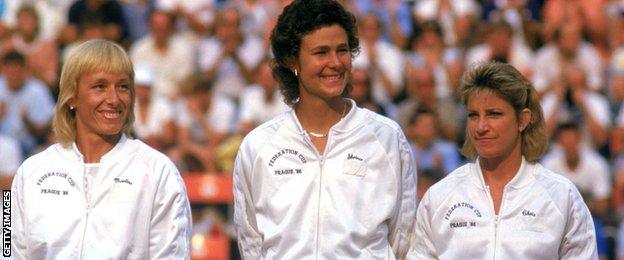
Martina Navratilova, Pam Shriver and Chris Evert played for the United States in the Federation Cup in the 1980s when 32 countries competed over one week
"When Great Britain got to the final against USA [in 1981], there were 32 teams in Japan. It was a good event," said former world number five Durie, who featured in the doubles alongside Sue Barker in that final.
"There's one week, you know where you are, there's 32 teams that can have a go - maybe it would be good to go back to that."
The International Tennis Federation wants to turn the Davis Cup - the men's equivalent of the Fed Cup - into a one-week tournament featuring 18 countries, while there have been plenty of calls for a revamp of the Fed Cup.
When she resigned as GB captain in 2016, Judy Murray said: "Things have got to change. The GB team has been stuck in the 16-team Euro-Africa Zone for an eternity.
"If you don't make the play-off, there's nothing until the following February, making it impossible to build any momentum on or off the court.
"Everyone can see the buzz created around the home ties and team tennis at all stages of the Davis Cup. Fed Cup should be afforded a similar format."
The Osaka factor
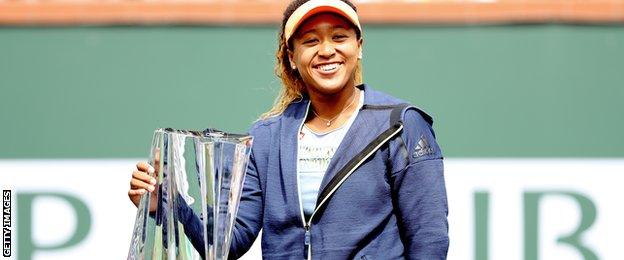
Naomi Osaka beat Maria Sharapova, Agnieszka Radwanska, Karolina Pliskova and Simona Halep to reach the Indian Wells final
While Britain's women's tennis is, according to Fed Cup captain Anne Keothavong, "at its highest point in over three decades" with eight players ranked in the top 250 in the world, the form of the team's singles players has been shaky of late.
Konta has slipped from ninth in the world rankings at the start of the year to 23rd, while Watson, ranked 77th, is on a run of seven successive losses and has not won a match since January.
That is in marked contrast to Japan's top player, Naomi Osaka, who has climbed to 22 in the world from 68 at the end of 2017 and last month won Indian Wells - one of the most prestigious tournaments outside the Grand Slams.
Asked where this weekend's tie would be won or lost, Salmon and Wood immediately responded with the same question: "Is Osaka playing?"
Durie added: "Naomi Osaka is a very good player who is on her way up.
"But she has been winning a lot. Sometimes that is a different kind of pressure, and at home in Japan they expect their players to play well and perform, so she will have that pressure on her, for sure. She might be a little bit nervy.
"We just have to be strong and step up."
A reason for British optimism is Osaka's head-to-head record against Konta, the Japanese 20-year-old having lost their two tour-level encounters last year.
Forgetting about Nastase
Fed Cup: Play was suspended last year when Johanna Konta left court in tears following verbal abuse from Romania's captain Ilie Nastase
Britain's defeat in Romania last year was overshadowed by home captain Ilie Nastase verbally abusing Konta and Keothavong and swearing at the umpire, which led to him being suspended by the ITF.
Konta left the court in tears and her match against Sorana Cirstea was suspended for 25 minutes in a tie that Romania eventually won 3-2.
Durie called on this year's players to learn from the experience as it "probably can't get much worse that that".
"There might have been things said to me on court in a team event but you've got to use that to spur you on and think 'they can say what they like to me but my racquet is going to do the talking'," she said.
"You are going to have a few of these moments in a team event. The crowd are going to be against you but you've got to enjoy that situation and the battle and get the best out of yourself.
"The Japanese are a little bit more polite. They will be cheering but I don't think it will get to what happened last year."
And what other advice would the 1993 team give to this year's?
"Relax and enjoy," Salmon said. "Don't feel that pressure of we haven't done it for 25 years.
"Just keep knocking on that door and it will eventually open."
- Published19 April 2018
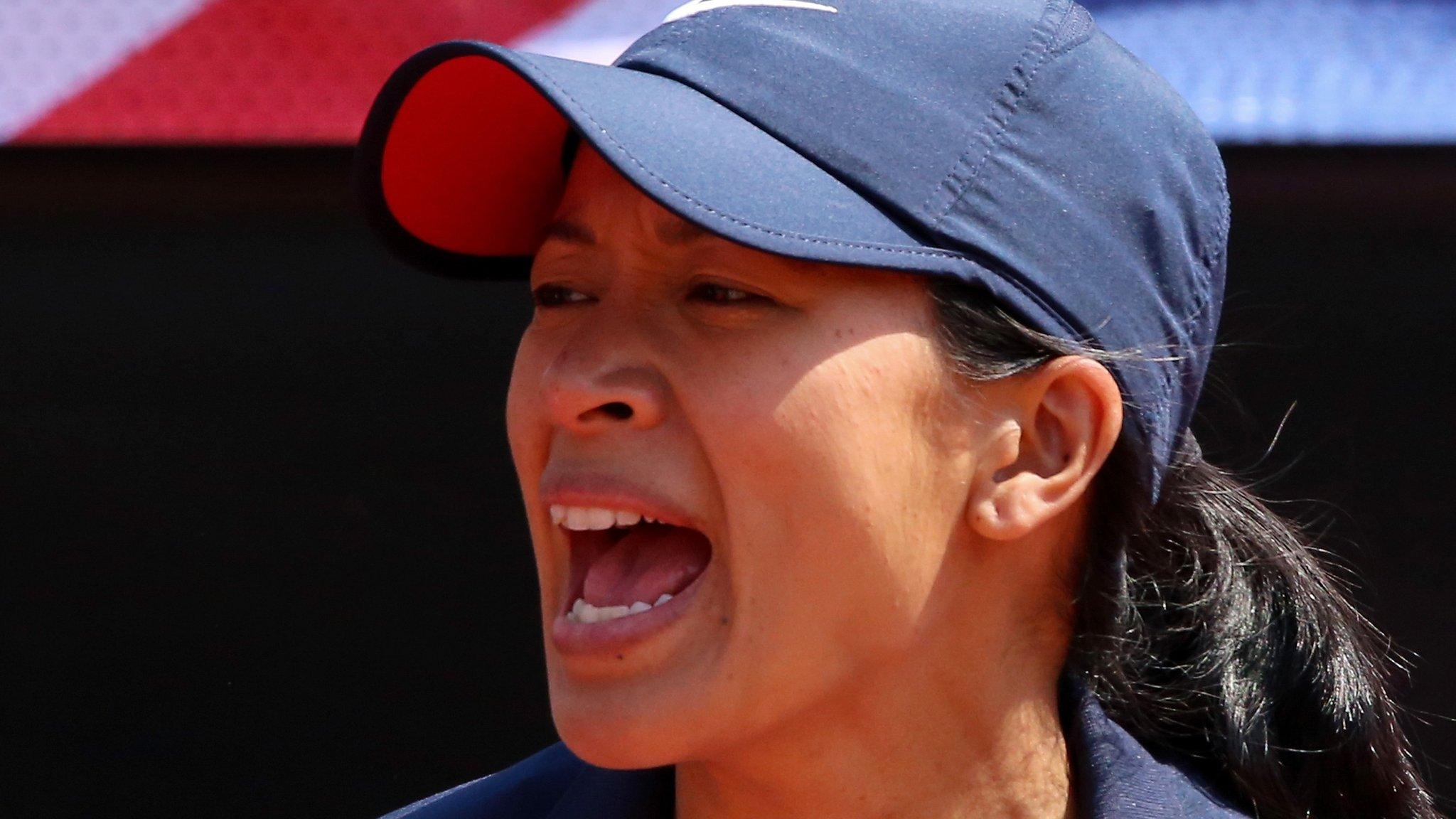
- Published12 April 2018
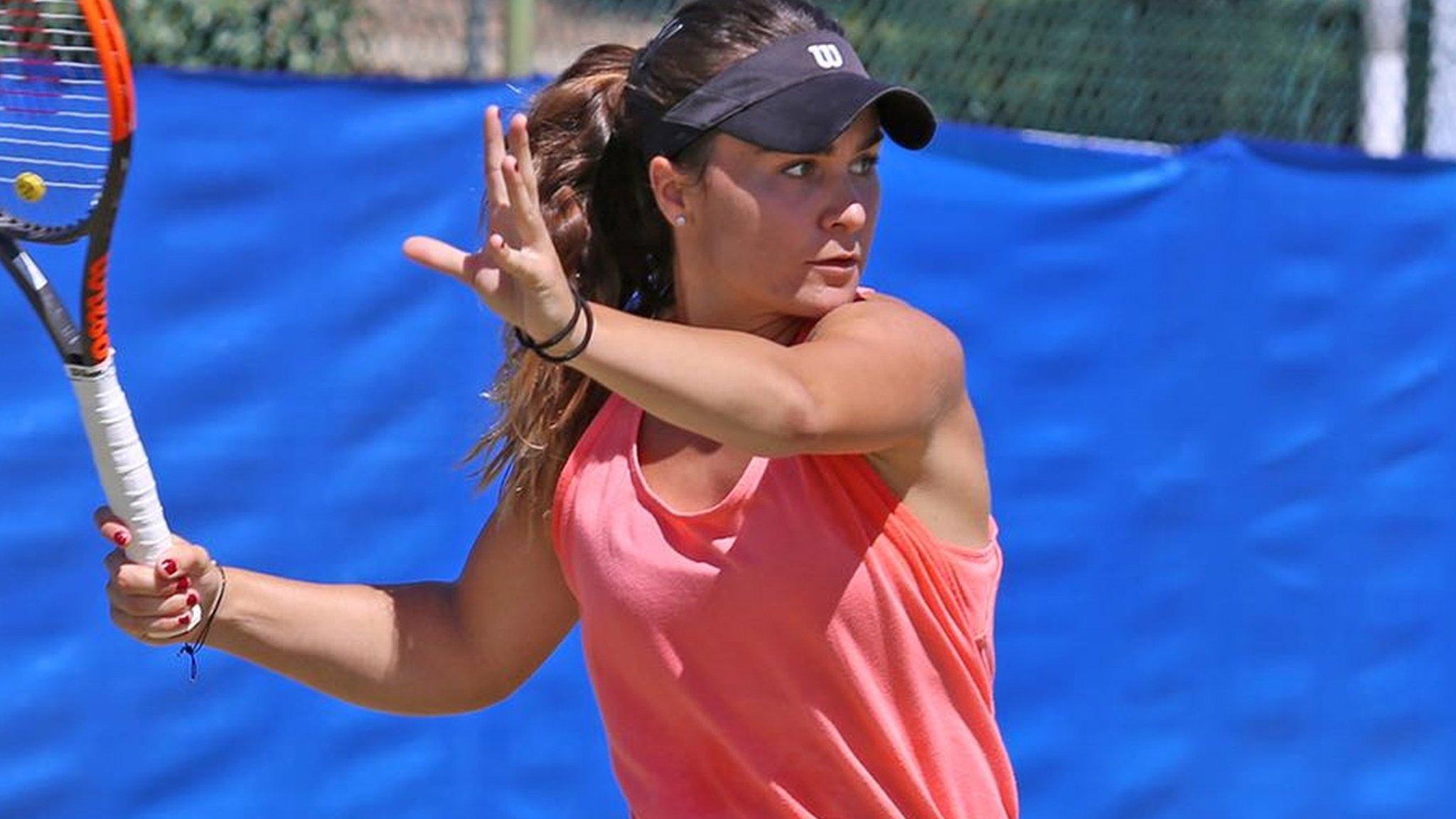
- Published11 April 2018

- Published13 February 2018
